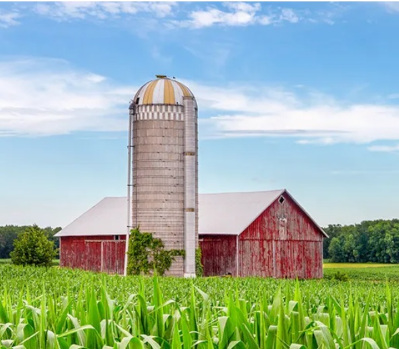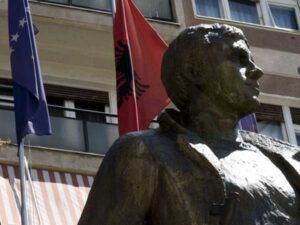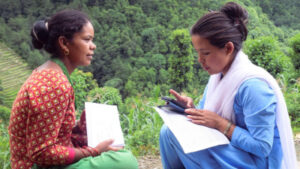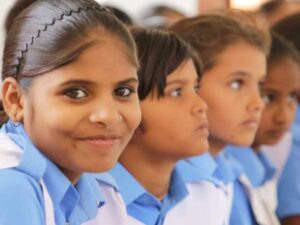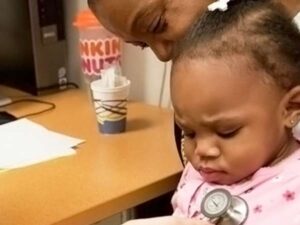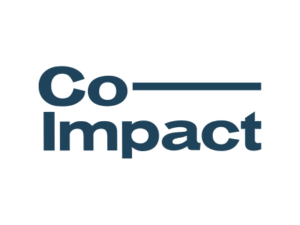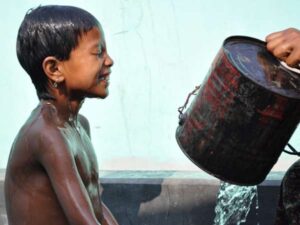Heartland Fund addresses the gap in funding for rural areas, particularly BIPOC communities, by connecting rural leaders with funding partners seeking the uncommonly high returns on investment generated by building permanent, powerful civic infrastructure in small cities and rural communities.
Sarah Jaynes of Heartland Fund spoke with Erica Edwards on February 16, 2023. Click here to read the full conversation with insights highlighted.
Lissa Harris: Hello, can you start by introducing yourself and your organization, and speak a little bit about the problem that you’re tackling and how you’re trying to solve it?
Sarah Jaynes: I’m Sarah Jaynes. I’m the executive director of the Heartland Fund, which is part of the Rural Democracy Initiative. The Rural Democracy Initiative and Heartland Fund are dedicated to building power for progress in rural parts of the United States so that we can change what’s possible in the country overall. Our theory is that one of the reasons why we’re facing the kind of problems that we have faced in the country with challenges to our democracy and some of our core freedoms like educational freedom, reproductive health, et cetera, is because we have under-invested in rural places and small towns, for decades, honestly. It underlies divisions that have grown in our country between urban and rural people and communities and voters. It’s part of the kind of economic decline and challenges that many rural communities face, and it’s also led to a lot of misunderstandings about the promise of small towns and rural communities.
We are leading a philanthropic charge to invest more money in rural spaces, and also to change the narrative about what’s possible in rural America, and to innovate new strategies and tactics that are particularly effective working with rural people.
Lissa Harris: Who do you work with most directly and how do they benefit from your work?
Sarah Jaynes: I would say we have two primary communities. One of them is our grantees, we work with about 150 groups that are grassroots organizations primarily. They’re on the ground in over 25 states throughout the country, and often they’re regionally based, so they maybe cover seven counties in North Carolina or something like that. Sometimes they’re statewide, but have an emphasis in rural areas. We also have some multi-state or national organizations that work on rural issues or with rural people, and have a rural specialty. These groups work on policy change, civic engagement, democracy defense, communications; making sure people have access to high quality information in places that are often news deserts or information deserts or are targeted with disinformation.
Those are the sort of groups that we fund, and that’s really where our power comes from is this incredible network of grassroots groups. It’s an emerging field. When we started five years ago, many of these groups didn’t even exist yet, and so we’re often early investors and can give them the anchor funding they need to be able to hire staff and grow into sustainable organizations. Then we also provide resources to them beyond the funding so that they can have support with fundraising or data or narrative and communications, et cetera.
The second group that we really serve is funders. We’re a funding collaborative, so funders join the Rural Democracy Initiative, and the Heartland Fund is our 501(c)(3) funding collaborative. They join the Heartland Fund because they want access to the information, the insight that we gain from the groups on the ground. Sometimes we help them with a particular grant-making strategy, maybe they’re interested in economic development or democracy or a bridge-building strategy. We’ll help them not only with sub-granting their funding, but help them with their own grant-making strategies.
We’re a real learning community also. One of the reasons why I think philanthropy has pulled back from rural investment is that most philanthropies are based in big cities or based on the coasts. They’re based in places that are urban, and they often don’t know that much about what the needs are, what works, what are the most promising efforts in rural places, and so we can provide a lot of guidance and education, donor education.
Lissa Harris: What do you think makes your approach distinctive from other groups that are operating in a similar space or on similar problems?
Sarah Jaynes: Well, we’re really the only funding collaborative that’s exclusively focused on rural grassroots power-building and civic engagement. That makes us distinct, first of all. We looked around and there’s just nobody else out there in the space. So that’s one thing. The second thing I think is that we also have a 501 (c)(4), so we can do both civic engagement and issue education work, and then we also have an arm that can engage more in politics. I think that that is often very helpful because people, as they’re working on maybe a policy change that is important for their community, maybe a change about immigration or healthcare access, eventually they run up against needing to do some work around the leadership that represents them. They can also have access to the 501(c)(4) arm, which is called the Rural Victory Fund. That’s something I think that’s also distinctive, being able to work across those lines.
Most of us who are on our team come from an organizing background or grassroots campaigns, so we have a really strong kind of trust and identity with our grantee network. We’re really in partnership with them. There are countless examples every day of where we’re helping to connect our grantees with each other or with another funder in the field, or say they need somebody to look over grant materials that they’re sending to another funder. We’ll take a look to help them make sure that they’re talking about things in the right way. We talk with our grantees every day and we’re really close to the fields. I think those are some things that are distinctive.
We also have added two, three new programs since we started. We added a rural climate partnership program that’s focused on rural climate solutions, and we have a lot of expertise in clean energy siting, rural electric co-ops and climate-friendly agriculture, things that not everyone is thinking about in the philanthropic space. Then we just stood up a new program called Resource Rural that’s about bringing the huge opportunity of the new federal funding through the Inflation Reduction Act and the bipartisan infrastructure law, et cetera, making sure that the funding lands in rural communities.
Again, we’re kind of the only group that’s focused just on rural areas, and rural areas have unique problems when it comes to accessing that federal funding because their local governments don’t have the staff to pursue grants, for example. They don’t have grant writers like Seattle or Boston have, and even the NGO community there locally, they don’t have large, fully built-out NGOs that maybe have a current audit and the ability to apply for a federal grant and to monitor it through. Or even if they got the grant, they don’t have the workforce developed locally to put in the heat pumps or to build a project.
We’re looking from start to finish about what these rural communities need to be able to access this opportunity. I think that’s another thing that makes us unique is that we’re working across rural spaces, but all of them actually intersect with strengthening our democracy and strengthening what’s possible in rural communities. For example, it’s very alienating for people when they vote and they think that something good is going to happen in their community, and then they find out that the administration has passed $4 trillion in new funding and then they don’t see any of it coming to their town. Then they think, “Well, people don’t care about us, and why should I vote?” But it’s not really because people don’t care. It’s that literally their town doesn’t have the people to even apply for that funding that’s available. So we’re trying to knit the fabric of our democracy together through some of this work on issues and federal opportunities.
Lissa Harris: Is there an example you can share that illustrates the impact of the work that you’re doing in communities?
Sarah Jaynes: I mean, I have so many examples. I think a great example of impact is in the 2020 election cycle, we funded a group called We the People Michigan. They work across Michigan, from Detroit up to Northern Michigan and the Upper Peninsula, and they bring together organizers who are based in place, leaders from these areas to train together, and have each other’s back. It’s very hard work to do organizing in inner city Detroit, and it’s also very hard work and risky to be doing organizing in counties in Northern Michigan where often folks who are fighting for progress are ostracized from their communities for being in the fight.
Because of the hundreds of leaders that they’ve built and the connections that they have with their county auditors and their local newspapers and their small business people and the farmers. Then when the election was challenged, I don’t know if you recall when the election was challenged in 2020 in Michigan, We the People was really the group that was able to bring everyone together and to make sure that that election was certified because it was pretty unassailable when you bring all those voices together from across the state that they weren’t just representing one particular interest. That’s an example that I think encapsulates our bridge-building and power-building vision.
Lissa Harris: What do you think the insights or the teachable lessons are that can be taken from your work that others could learn from and apply?
Sarah Jaynes: We have rural specific lessons and then we just have lessons in general. One rural-specific lesson is that rural is not a code word for white. Often people say rural when they don’t really want to talk about white people. So like, “rural people this” or “rural people that.” And that does a disservice on both sides. First of all, 25% of people who live in rural America are people of color, and in a lot of places it’s even higher. Think about Black folks in the rural South or a lot of places on Native reservations. Like in the Navajo Nation, you have high concentrations of Native people. In rural South Texas or Arizona, you have a lot of Latino people. I think that’s just one lesson to think about, I mean, spread across the whole country, you’ve got 25% of rural people that are really being made invisible by this idea that rural people are white farmers who are conservative on issues.
Another lesson is that we just have done work with CIRCLE at Tufts University on rural young people, and rural young people are even more racially diverse, and they are the most undecided and the least contacted voters of anybody. These are people who often aren’t participating because nobody is talking to them about the issues at stake, and they just don’t even have any idea how to vote. That’s an incredible opportunity.
Another lesson is that you really need to have people speaking in their own voice and with their own words in rural communities if you’re going to be communicating about an issue. Even if you’re in DC or New York and you’ve done all the polling in the world and you have the perfectly crafted message and you think you have the right spokesperson and you make an ad or you put out a digital media or whatever, you get the cultural cues wrong or you say just one little thing wrong about the issues happening in the community. Now everybody knows you’re not from there, and then it immediately has a backlash, where they are now opposed to the thing that you’re trying to talk to them about because they’re like, “Who is this person trying to pull the wool over our eyes?” Our bottom line is that the messenger is as important or more important than the message, and that local people know how to talk to their neighbors. You’d rather have kind of an “unpolished” local person talking about the issues than some polished, message-tested piece of communication. We’ve got a million lessons, but those are a few that are rural specific.
One of the things that’s not rural specific is that because rural organizations have to talk to people across differences, you can’t be in a bubble if you’re in a rural place. You don’t have that many people. People are all across an ideological spectrum, across race. You have to learn how to talk from a values perspective and listen to what people are saying is impacting them and responding directly to that and tying that to the issue that you want to talk about. All of the folks that are working in our network are just expert bridge-builders, and they’re able to take really bold, strong positions on important issues, but talk about them in ways that feel really common sense to everyone, whether they’re talking about abortion or immigration or education or gay rights. I think that we would be well-served in the entire movement for change to be actually communicating like that. It’s one of the reasons why I’m interested in spending the rest of my career working in this space, because I think that we kind of have the magic special sauce about how to talk to people in this country.
Lissa Harris: How do you measure success? What’s the evidence you use to track that you’re making progress?
Sarah Jaynes: We start by measuring success according to what our grantees tell us is how they measure success. It’s a question that we ask when we invest in our grantees, “How are you going to measure success?” Then we track against what their goals are. We, secondly, are measuring success by just money moved into the field. When we started, we had research that showed that although rural people are about 20% of the population, only 6 or 7% of philanthropic dollars go to rural America, and so actually increasing that percentage. At our five-year mark, we’ll do a study and see if that has increased over time. I think that would be a really strong marker of success for philanthropic dollars and then our own budget, what we’re able to move into the field.
The first year we had a million-dollar budget. Now we’re hoping to be able to move about $20, $25 million into the field next year, so that’s a measurement of success. So much of our work is aligned with other larger funders, so it doesn’t stop and start with what we’re able to grant. Then we’ll have specific metrics like, have we been able to increase voter turnout? We saw in 2020 and in 2022 in rural Southwest Georgia, which is really a high rural black population, a significant increase in voter turnout, and it was really just groups that we ran into that were doing that work. That’s another way that we can tell that we are making a difference are things like that, that are just about more people participating, and maybe more people having access to high quality information.
Lissa Harris: Sometimes we learn as much from things that don’t work as things that do. Is there an example you can think of for something that you tried that really didn’t work out that you learned something important from?
Sarah Jaynes: Somebody asked me that yesterday, and I don’t have a good answer. We’ve been really lucky that a lot of things do work. I think that we invest in a lot of groups that are in the early stages of their development. We’ll meet a new leader who wants to be an executive director of a new organization, and we can spot talent and a good idea and the conditions for success, and so we’ll often be the first person to grant to them and help them hire on a staff and run a program. Sometimes that is successful, and sometimes it’s not.
I think probably the biggest lesson that we’ve learned about the ability to be successful in that circumstance is the ability to fundraise and to talk to donors. A lot of these groups are people who are good at talking to their neighbors and working on local issues and motivating people to get involved. They’re not folks who know how to talk to a large foundation and to use all the right 501(c)(3) terminology and know how to talk about their metrics for success or how to present their data from the voter contacts that they make in a compelling way that makes a case for themselves. It’s very hard and frustrating sometimes that we have this incredible talent and they’re doing great work, and the missing piece is having the training and the staff support to be able to translate that into the audiences that influence resources. Again, if you’re in a city, odds are that you have access to someone who can help you with that translation. Out in Yuma, Arizona, that’s not readily available.
Lissa Harris: I’m wondering if you can talk a little bit more about broad scale challenges, and setting aside the funding for now, just because that’s something that everybody struggles with, what are the major challenges or barriers that you haven’t been able to overcome?
Sarah Jaynes: Well, the biggest barrier is just the toll that the past decade has taken on our leaders, particularly since COVID, but we’re not able to retain and nurture our top talent in terms of leaders of organizations because they’re working way too hard. It’s totally untenable. It’s extraordinarily emotionally draining to be in these crisis situations. Many folks get into the work because they had a dire need in their community around housing or immigration or healthcare access or something. These are folks who are not wealthy, not necessarily secure in their own lives. Their families are insecure and their communities are insecure, and so they’re just experiencing so much trauma all the time. They’re trying to do this hard work, they’re working too hard, and then they’re surrounded by a lot of trauma, and especially through COVID where a lot of people were sick and dying, even.
There’s been so much fluctuation of the labor markets also, so it’s hard to hire and retain staff. There’s just been challenge after challenge after challenge, not to even mention the toxic political environment that people are working in. It breaks my heart when I hear from some of the leaders of organizations that we support or are in community with, and they just have to go, right? They have spent every last ounce of energy, and they just, for their own self-preservation, have to get out and do something else.
I’ve worked in social change movements for 30 years myself. I’ve had the incredible privilege of being able to be in a stable enough environment to maintain that, and even I’m getting pretty darn tired at this point. I don’t know what we can do about it, but it is the biggest crisis. Because as soon as people get really good is when they’re at the edge and then have to leave, and I don’t blame them. I have that conversation with our leaders of our grantee organizations of, “Talk to me, whatever you need before you get to that point, we have resources to support you. Whether you need to take a sabbatical or you need to give yourself a raise or you need to get a deputy director, or what is it that you need?”
I think a lot of times folks feel like they’re just bootstrapping it out there and aren’t able to necessarily lean on a broader community to get the help they need. Security also, organizational security, personal security, digital security, is a huge issue. A lot of our grantees, their lives are threatened, and that is a layer of stress that people should not have to deal with. So we’re working as part of a collaborative effort to put together a rapid response fund to give people the security support that they need when they need it, no questions asked, but again, that is a huge problem.
Lissa Harris: Can you talk a little bit about how specifically you’re working to advance systems level change in the field?
Sarah Jaynes: One example is we gathered, twice now, in 2021 and earlier this year in 2023, we gathered a diverse group of rural policy experts from around the country, about 50 folks, and then we also did tons of interviews and small group meetings before that to put together a rural policy action report. These are the most popular and pressing policy solutions that people need for a wide range of issues that we should be able to pass. These are not pie in the sky, like “Someday maybe we’ll do it.” These are things like, if you pass them right now in a rural community, it would make elected decision makers popular. It’s things that people want, but it’s not necessarily the obvious things.
I think when most people think about rural policy, they think about agriculture (AG) policy, the Farm Bill, right? That’s such a small portion of the issues that people are facing when they’re facing down. How do they get care for the elders in their family, or how do they get broadband access? Or housing insecurity or safe housing. So much housing is just old housing stock that’s not actually safe and healthy. We put together a report every other year that assembles all of those into a rural policy action report that people can use as a tool in their toolbox for their local community, or they can bring it to their representative in Congress or their US senator and really start to change the dialogue about what rural issues are. We found from our 2021 report, a lot of those got passed, and so we felt very promising. Then for our 2023 report, which just happened, we haven’t had a lot of opportunity to pass things this year yet, but we’re hoping it changes the dialogue. As we head into a big campaign season where a lot of elected decision makers are talking about issues, this will really set the table for how they talk and think about rural issues. That’s one example of structural change.
Another example is we were the driving leaders of a program called the Winning Jobs Narrative, and it’s a narrative framework. We’re talking to working class people about jobs and the economy. We heard from our grantees in the field in 2020 that they’re having a really hard time connecting with working people about economic issues, and they didn’t have the right words and they didn’t have the right concepts. So we helped, along with a few other funders, lead this incredibly in-depth research and creative message testing process. You can go to www.winningjobsnarrative.org, and it is, I think, one of the most ambitious opinion research projects ever conducted. It is for talking with working class people about the economy, and it really centers workers as the heroes of the story and the government is providing tools and opportunities that help working people be able to take care of their families as opposed to getting some sort of handout from the government. I think that’s a huge structural change, being able to talk about the economy in a different, more powerful way, and it works across race. It’s particularly compelling for working class Latino and Black voters, but also works with white people and across urban and rural areas.
Then I think just democracy, always fighting for expanding democracy and fighting against the efforts to contract people’s access to the vote. Maybe it’s about getting more ballot drop boxes on Native reservations, or we’re working right now in Ohio with grantees on fair districts and expanding voting to include same-day voter registration and automatic voter registration so people don’t get purged from polling locations. Or our grantees in Kansas and Georgia have been fighting for the ability to support voters as they’re waiting in line or to bring voters to the polls, which has been challenged in court. Sometimes they’re legal battles. We’re just constantly thinking about improving democratic access for people in rural communities, especially rural communities of color and with rural young people.
Lissa Harris: What do you think is most needed from other actors in the space, other partners, whether that’s the grantee organizations that you work with or government or funders?
Sarah Jaynes: Money, which you already said. I think that’s a given, that groups just need more capacity to be able to advance systems level change. We didn’t talk about this when we talked about hurdles, but the other one, in addition to leaders, is information. Access to news and high quality information and the ability to fight against disinformation. I think anything that supports that. Rural people often are the ones whose local newspaper is going away. They don’t have access to the regional television station. The rural radio stations are being taken over by folks who maybe aren’t giving the full truthful information, and then they don’t have broadband access or cell phone access, and so it’s really hard to get information. I mean, you’re probably familiar with some of these things living in a rural space.
Lissa Harris: I actually started a rural news outlet and ran it for seven years, so yeah.
Sarah Jaynes: So you know what I’m talking about.
Lissa Harris: Yes.
Sarah Jaynes: That’s a place where I think structural solutions are important. We are supporting, for example, the National Trust for Local News, which you might be familiar with. They just launched a project called the Georgia News Conservancy, which is essentially buying at-risk news organizations in the Georgia Black Belt and putting them in a trust and then running the backend together for greater efficiency and financial sustainability, and then doing recruitment and training of Black reporters and editors. So really just kind of preserving this incredible, just like a land trust, community asset. Thinking about things like that, how can we protect what we have existing right now?
I think maybe the other piece is just showing up. If you live in a rural community, people from the capital or your larger cities, they just don’t come and visit. I think it makes a huge difference in terms of structural outcomes when people see both the challenges, but also the incredible resilience and creativity and opportunity in these close-knit communities where just a small amount of attention and resources, your dollar goes so much further in a rural space. People are willing to volunteer and work together in ways that are just different than in a city. Many times our grantees, they’re working for the NGO, but then they’re also a farmer and they have a small business and they’re teaching at the community college. Everyone’s just doing so many different things, and so I think having folks who are from the centers of economic and political power to visit and show up, let people know that they’re listening, and then take the needs and solutions back, I think is also really important.
Lissa Harris: How do you see your work evolving over the next five years?
Sarah Jaynes: I mentioned our rural climate partnership and Resource Rural, which are new. We have already evolved from just focusing on issue education and advocacy and civic engagement and democracy work, which was really kind of our bread and butter, to adding these other programs and pillars. That’s going to make a huge difference when we integrate all three of those programs. People who are knocking on doors talking to people about issues in their community can knock on doors and let people know about an incentive that they can receive to the heat pump in their house, or weatherization, for example, or when they can use a federal grant to bring solar panels to their church, and that can help save the church money, and then the churches can start a new homelessness project or something, right?
Those are really wonderful opportunities to knit together the democracy and the issue and federal program work. I think it’s going to evolve in that way, and then we also have noticed that a lot of our grantees are moving more towards mutual aid and direct service as a cornerstone of their civic engagement work, because I think people are feeling so kind of frustrated and burnt out with the divisiveness of politics and feeling like it’s just always ugly and toxic and people don’t want to participate. When you can actually just bring somebody something that’s purely good, something they need, food or childcare or clean water, and have that be paired then with the civic engagement conversation, I think that’s another way that I see it evolving.
Lissa Harris: We’ve covered a lot of territory, but is there anything that we didn’t get to that you thought was really important to add or to expand on?
Sarah Jaynes: Maybe the one thing I didn’t mention is, another misconception about rural people is that they aren’t for progress on issues. What we find in all of our polling and our door knocking, et cetera, is that it’s really about connecting it to something that’s personal for them and connecting on values, but that rural people are very kind of populist. They value freedom, which translates to not wanting people mucking around with how their kids are educated or their access to important healthcare services, for example, that are very aligned with some of us who are fighting for progress. Their highest value outside of freedom is in group care. So caring for the people in their community and their family and their neighborhood and their community, and that can really translate to a lot of compassion on issues like immigration, for example. When you make your local immigrant community part of your ingroup, suddenly it really shifts the conversation.
I think my message is that folks in rural communities share values that are broadly held across urban and rural spaces, and that it’s best when you start with those values and then you can move into the issues that you’re talking about. There’s this kind of like, “Oh, we don’t have anything to say to people who live in rural communities, because they’re not going to agree with us.” And that is just not true. Often they feel alienated from kind of progressive politics, but that’s different than caring about the issues that we care about, making sure that kids have a good high quality education, making sure that your seniors are taken care of in their old age, things like that.
Another example is when talking about climate, don’t say the word climate. Talk to folks about their crop yields or saving money on electricity or not having to breathe diesel fumes. Those are the things that you start talking with people about, and then you can move into a, “Oh, and by the way, it’s good for the climate,” which is usually the fifth thing on the list of concerns.
Lissa Harris: Thank you for sharing your time and your insight and for participating with us.
Click here to read the full conversation with insights highlighted.
Lissa Harris is a freelance reporter and science writer (MIT ’08) based in the Catskills of upstate New York. She currently writes about climate, energy, and environment issues from a local perspective for the Albany Times Union, her own Substack newsletter, and various other digital and print publications.
* This interview has been edited and condensed.
Learn about other philanthropic organizations that innovate ways of giving.

